Passengers flying from London Heathrow to Dallas – Fort Worth on American Airlines flight 51 and taking a connecting flight no longer walk to immigration, pick up their bags at customs, drop them back off to re-check them, and go through security again.
- Instead, U.S. Customs and Border Protection will set up immigration for them at the gate.
- Passengers will clear right there and walk straight into the terminal without going through security. They were cleared by security in London and that’s considered sufficient now.
- Checked bags will be transferred to the passenger’s connecting flight for them.
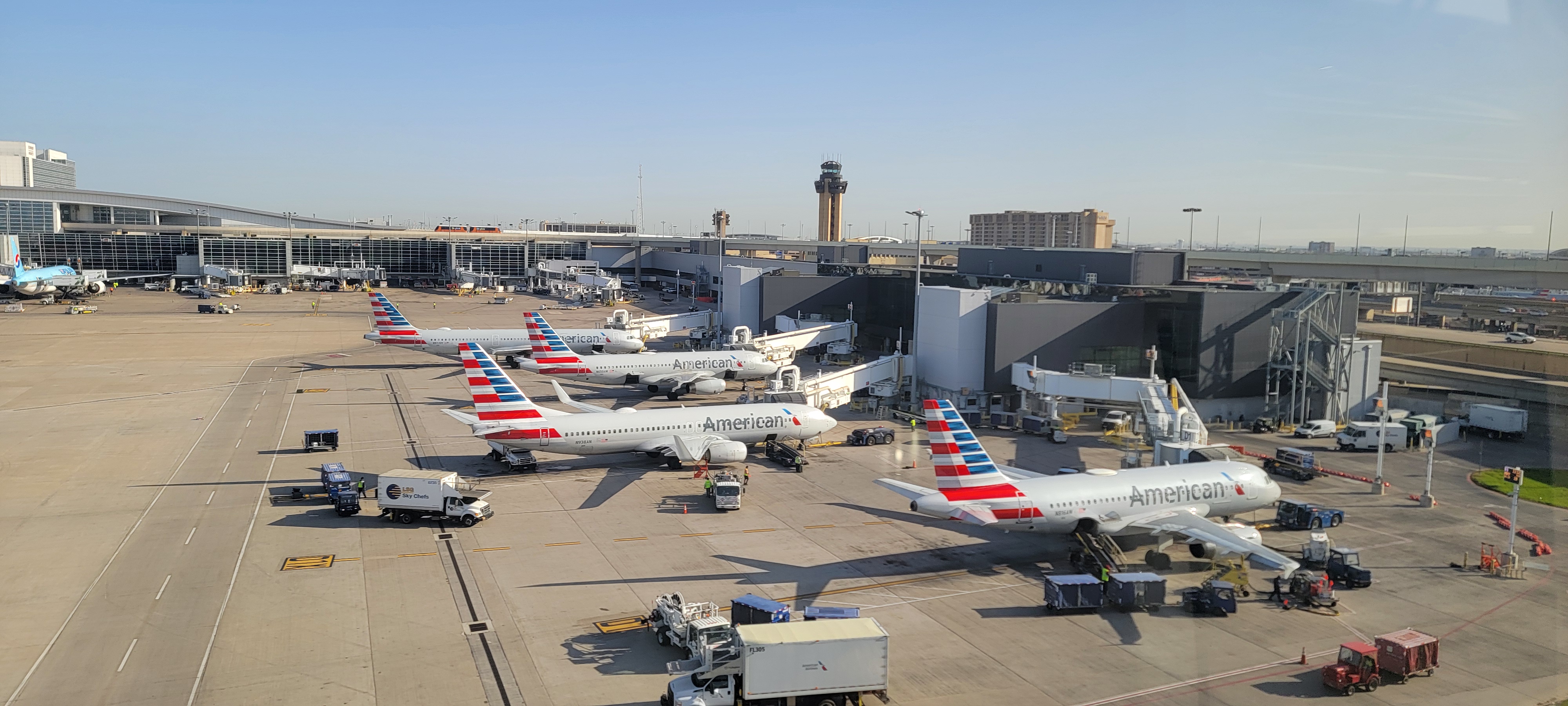
This started Thursday, and the test is expected to expand to additional flights, make things far better for passengers, and “cut connection time by more than half.”
While passport control is set up gateside for this flight, it’s only for connecting passengers and not for anyone actually ending their journey in Dallas. Here’s the internal memo from American Airlines explaining this process.
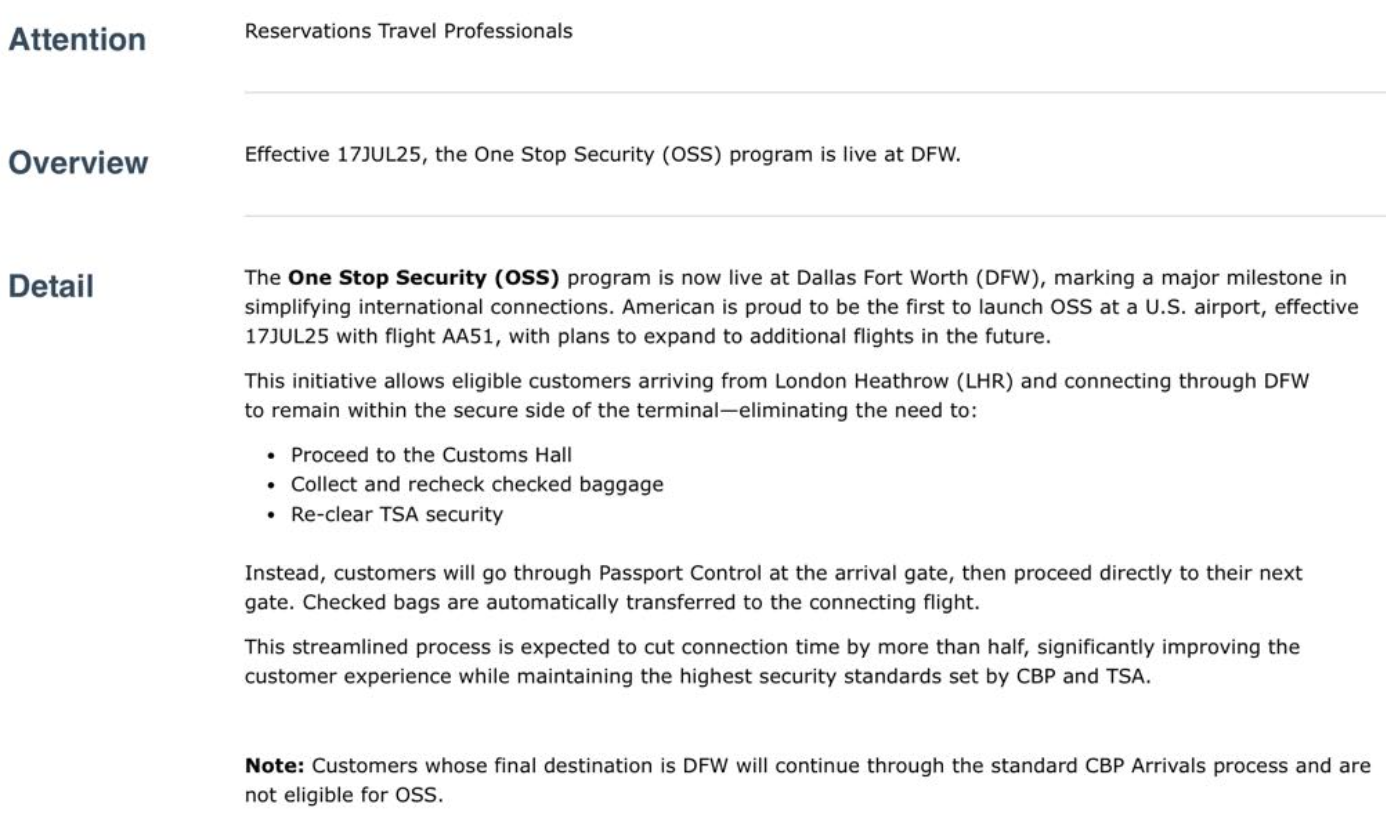
Back in January, passengers traveling on eastbound flights from Atlanta and Dallas connecting in London were able to skip security at their connection and proceed directly into terminal 3 or 5, heading to the lounge or gate for their next flight.
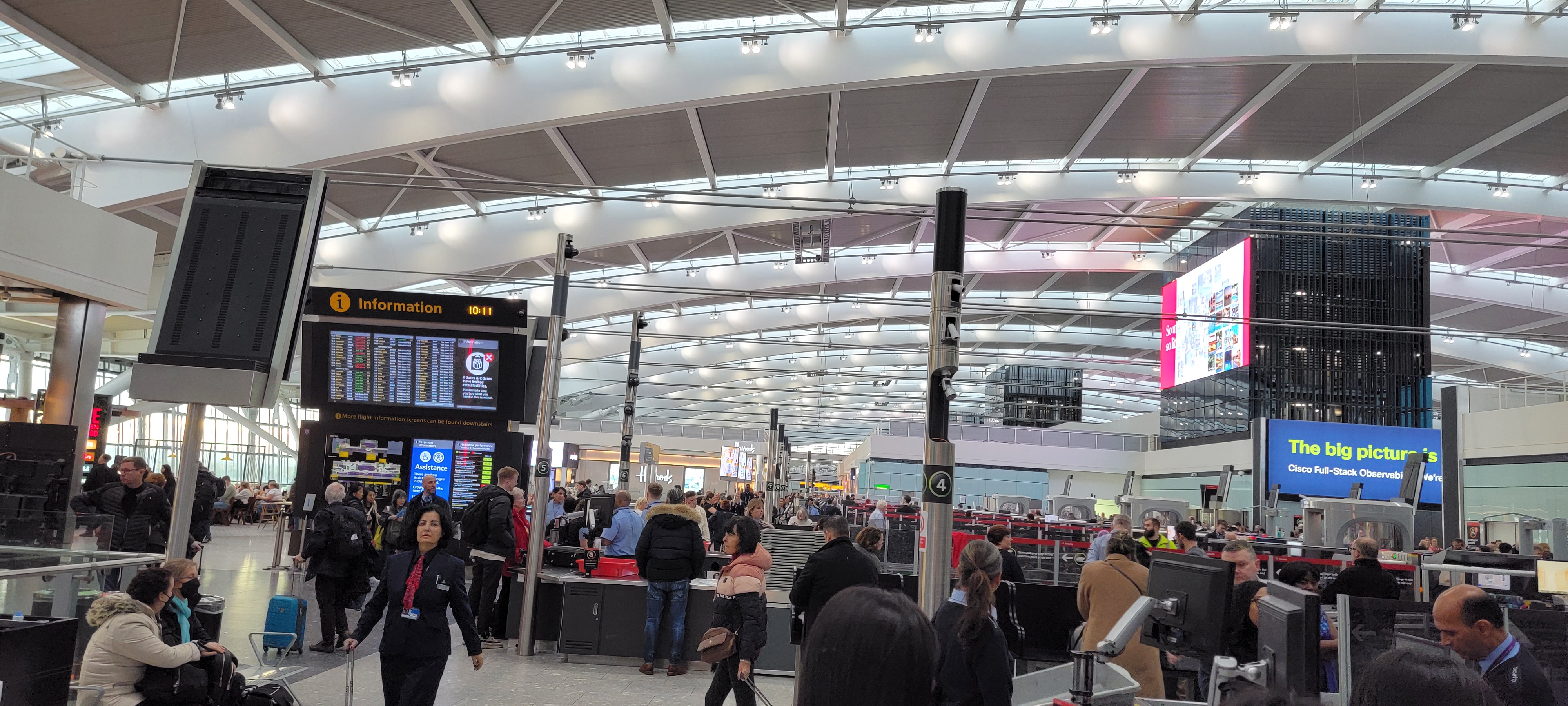
This actually makes London Heathrow more desirable as a connecting airport, even having to bus between terminals. My record there is three buses and 95 minutes though I’ve also had to do two buses and a train between connecting flights (and, in each case, still having to clear passport control and security).
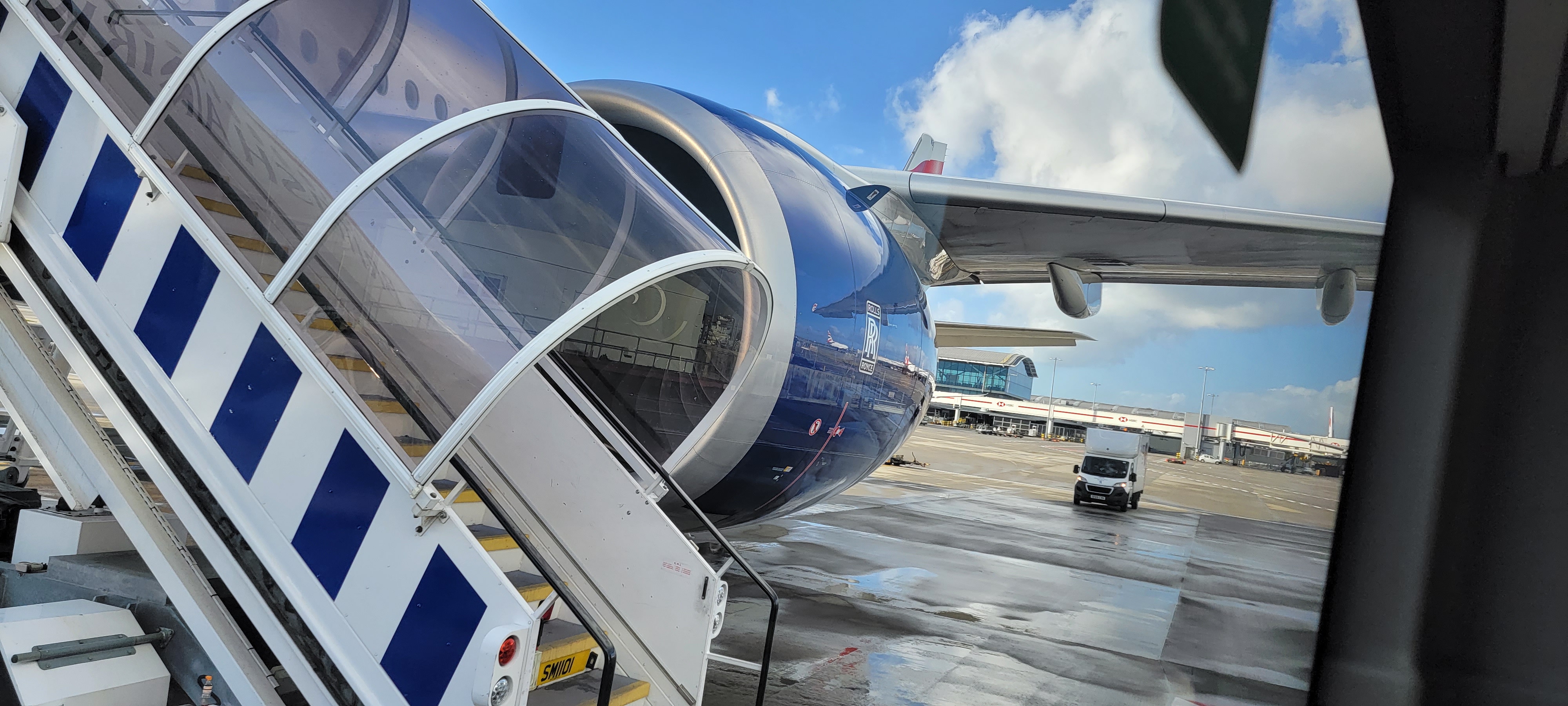
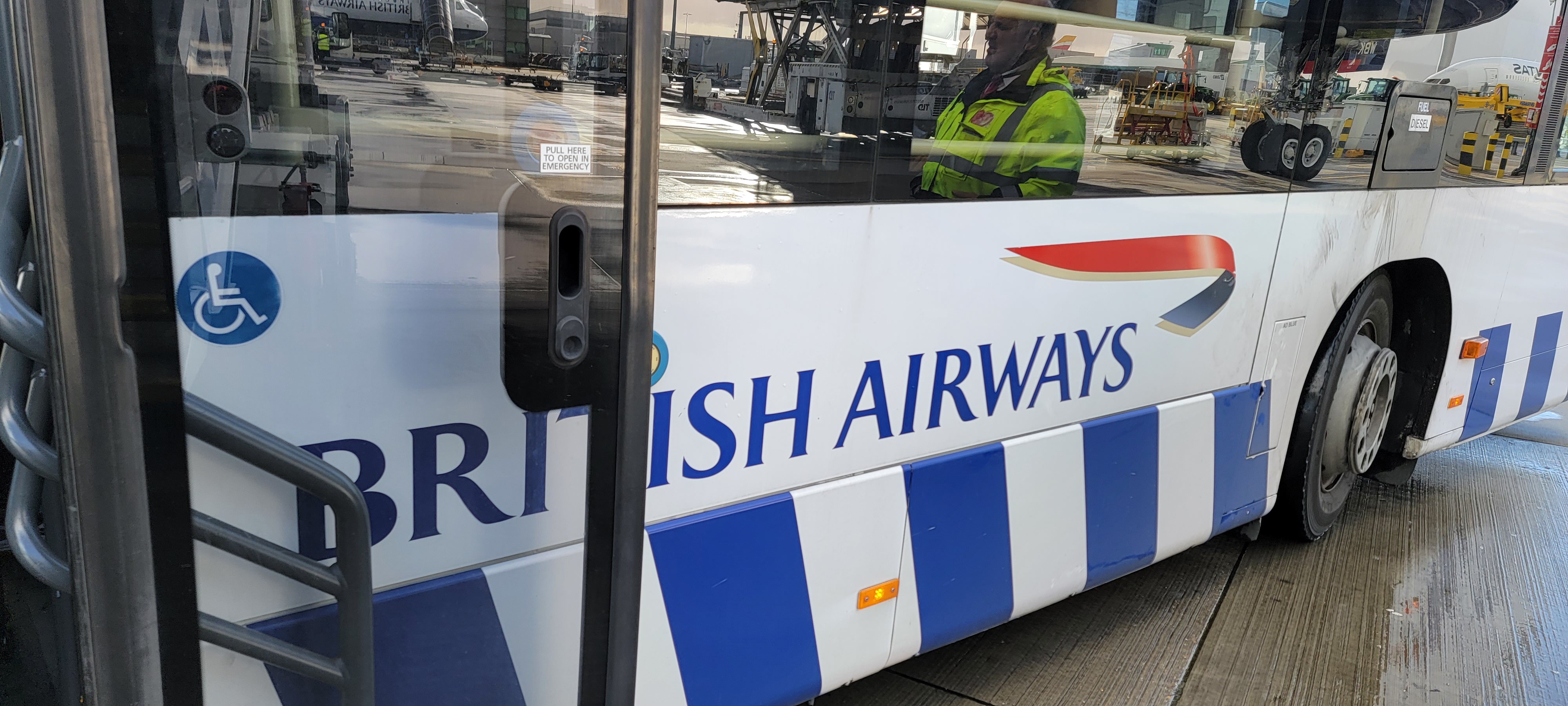
It’s great to see an expansion of ‘One Stop Security’ to westbound flights from London to the U.S. Historically, for the most part, U.S. airlines aren’t well set up to segregate international and domestic passengers – they usually co-mingle in the same terminals, and arriving international passengers could just exit the airport into the U.S. if they weren’t forced to go through customs and immigration immediately.
Setting up gateside immigration, and transferring bags, is an interesting solution. We’ll see how well this scales, but I look forward to trying it on my next London – Dallas flight. It’s almost enough to make me want to hop on the 8:30 a.m. departure from Heathrow instead of one of American’s four later flights to Dallas.
Meanwhile, American was also the first to trial international remote baggage screening for its Sydney to Los Angeles flight starting back in April, where passengers on that service connecting beyond Los Angeles don’t have to pick up their bags at customs and walk them through to re-check them.
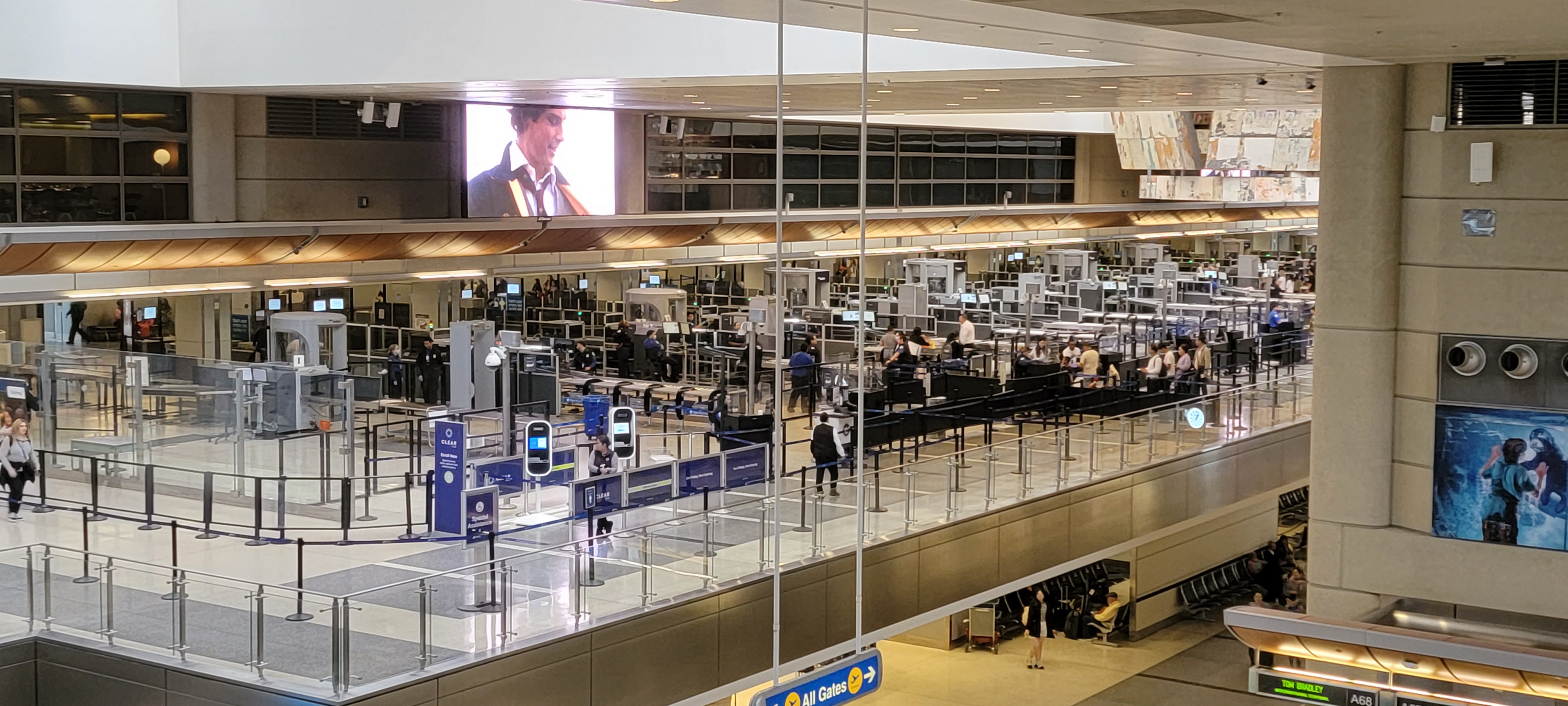
Those passengers do have to clear immigration and go back through security, however, as ‘IRBS’ is not part of the ‘One Stop Security’ program. London – Dallas is, indeed, the first westbound flight that’s part of that program.


Can’t believe TSA is becoming so proficient and streamlined……what is the world coming to ?!?!
Making history, eh? Wait till you learn about ‘Pre-clearance’ like from Canada (YYZ, YUL, etc.), Dublin, Aruba, and even Abu Dhabi… I know, ‘nuance’… Sure, this is a good development for some folks like LHR-DFW-AUS passengers (wonder who that might impact…)
This would affect my choice of airline if I were flying the route.
@1990, not that big a fan of pre-clearance. Most pre-clearance areas are tiny and cramped, with miniscule lounges. Plus, at least from Toronto, it seems to direct you to LGA!
It would be different if I were transiting on from the US site, though.
AUH is different, it has a fancy lounge after pre clearance. But autocratic petrostates are hardly a reason to have preclearance.
Good start. Hope it comes to Miami. Some of the connections from Latin America to US flights on the same airlines can get pretty tight when you are held up, even with Precheck and Global Entry. Waiting for the bags just to turn them in again is often the sticking point.
@Jon F — It really depends on the airport. Like, I appreciate it at YYZ, because it’s relatively efficient and the Maple Leaf lounge on the other side is decent, but not at AUA, where the lines to enter are often outside in the extreme heat or rain, and no distinction for Global Entry, etc., until after entering.
But, woah now, are we trashing LGA again? C’mon, the new terminals are excellent. You really should ‘try it again,’ if you haven’t been in a while. Was just through there yesterday and had a seamless experience (on arrival). Only the old LGA deserves any hate.
This is a game changer for sure, especially for people difficulty getting visas to the US: those customers have been buying tickets that involve sterile transfer or visa free countries, instead. Even as a Canadian, I want to avoid going through US immigration these days.
Im pretty sure they are not the first ones, at least for the luggage. I clearly recall going thru Toronto on my way into the US and NOT having to pick up my luggage for customs in Toronto (or after that). They also had some trial with electronic entry. This is years ago already.
This is pretty neat for sure.
But going to Europe through LHR it’s ridiculous having to go through security there.
From the US, going through Amsterdam, Frankfurt, Munich, Madrid- no need to clear security’- just go to connecting gate and do passport check if transferring to a Schengen flight. Way faster
I’ve cleared immigration, customs, and security maybe 10 times in the past year, at a variety of entry points (IAD, EWR, IAH, SFO, ORD). Apart from one slow entry at IAH where everyone seemed to be receiving extra scrutiny, it’s difficult for me to imagine how at gate screening is faster than my current global entry experience. In fact, unless they wheel half a dozen kiosks to the gate, I’m certain it will be slower. Maybe this is better for the typical traveler, but for those of us who are regulars I see zero advantage.
My last transfer (2 weeks ago) through IAD took all of 10 minutes for immigration and security, and most of that was walking. Maybe 1 minute each in line.
@1990 – I generally hate preclearance, especially on nonstop flight itineraries, because you need to build in any potential customs issues (lines, secondary, etc) into how early you get to the airport whereas on arrival it’s whatever it is – usually short, but I’m usually just going home anyways, so I don’t need any extra buffer time planned in. DUB is especially annoying because 1) there’s a line for everyone just to start for the 2) second security check where you must take out electronics, take off your shoes, etc. regardless of GE/PreCheck status, and 3) it’s a cramped waiting area in the ground floor once you are through, with a mid contract lounge as the only lounge option.
(also, I rarely check bags, so I’m almost never waiting around at bag claim either way)
Still don’t understand why you have to undergo immigration when only connecting in the US or move your own bags. This is a ridiculous policy and it’s like the US doesn’t trust their allies to do a good job at screening.
Also, making LHR more desirable is laughable at best, who in their right mind wants to connect through Hatethrow?
@Gary – “It’s almost enough to make me want to hop on the 8:30 a.m. departure from Heathrow instead of one of American’s four later flights to Dallas.”
Why? (Just curious.)
@Ben — It’s been nearly a decade since I went through DUB, but I do remember the anxiety, because, wow, the lines there can get intense, like 1-2 hours necessary. So, in this case, I’d say, DUB and AUA are ‘no,’ but realistically Canada is doing this just fine. I haven’t tried AUH, but I’ve heard it’s not bad there, which is kinda ironic, you know, since it’s literally in the Middle East and all *gestures broadly*
The whole idea of re screening bags is just ludicrous. Came through ATL recently, took bags off carousol walked 100 feet to another carosoul, DL employee took bag and “rechecked”. Not a CBP person in sight. Makes absolutely no sense if you are on a connecting flight.
@Kevin I get why it seems frustrating, but there’s actually a clear reason for this policy. If passengers didn’t go through U.S. immigration when connecting, even if they’re just transiting, it would create a major security loophole.
Without mandatory screening, someone could potentially “cheat the system” by simply walking out of the terminal and entering the U.S. without ever being processed by immigration. That would undermine the entire screening process and create serious enforcement issues.
It’s less about not trusting allies and more about ensuring that everyone who sets foot on U.S. soil, whether they’re staying or just passing through is properly accounted for.
This would be nice option to not have to claim and recheck bags. I did Dublin to DFW last month and thought it was very efficient. Got into DFW and could go right to Flagship lounge without having to recheck bags
Co mingle? I always assumed that’s what “sterile” international terminals were for.
Certainly at AAs fortress hub they would have this down pay.
Might be historic at DFW but I’ve seen it happen in Europe and in the US. Pre 9/11 in the US and Lockerbie in Europe.
@David427 — It’s a shame lessons were not learned after Air India 182, just years before Pan Am 103. Unfortunately, some here are quick to dismiss all airport security as mere ‘theater,’ which is as shortsighted as neglecting a levee because there hasn’t been a ‘100-year flood’ in a while. Another analogy would be those who think vaccines aren’t necessary because there hasn’t been an outbreak in a while. Measles anyone? To those that disagree, please keep ignoring history and risk. You’re special. The leopards won’t eat YOUR face.
Makes sense.
@Kevin, the reason your approach doesn’t work is that we don’t have sterile terminals. I have walked from an international departure gate to outside daylight without encountering any form of security control beyond passing through a one way door.
@David, the reason we rescreen passengers is that there are things permitted in checked baggage that are not permitted in carry-on baggage. I’ve had some substantial blades in checked baggage. You need your bags for customs inspection, but since you’ve had contact with them you could have transferred something prohibited to your carry-on.
But if you deal with the inspections outside the US you don’t need access to your checked bags in the US and thus do not need to be rescreened.
This raises the interesting question of the liquid rule. The UK is rolling out 2 liters maximum in carry ons.
It hasn’t reached LHR yet but when it does then this could impact this trial unless they do extra screening at the gate in LHR.
If one we’re to fly from one of the airports supporting 2 liters now (Edinburgh?) and airside connect through LHR, then presumably you could have two liters of liquid on your internal flight in the US?
So, i tend to think about how people move through systems and scalability. Processing nearly 300 people coming off a flight comes with logistical realities.
What does this mean if I have things like Global Entry or Pre-Check. What about items I bought duty free that are over the 100ml allowance? What if we arrive on-time and there are no staff available? What about during IRROPS? So many things I want to understand better.
I wonder how long it’ll take for the flight attendant unions (especially AFA-CWA) to release a statement opposing this and clinging to pointless security theater.
@Samus Aran — Nice callback; however, unions are not the problem, here, or generally. Can’t stop you from attempting to astrofurf for the oligarchs, but most folks care about workers and consumers, not the super rich, who keep hoarding wealth and distracting us, dividing and conquering, until the people wake up and demand better. And remember, there’s the ‘nice’ way and the ‘not nice’ way. I prefer the ‘nice’ way.
@1990 – It is not “attempting to astrofurf for the oligarchs” (typo unchanged) to criticize unions when they push for pointless (or even harmful) policies. It is known that AFA-CWA was not happy about the end of shoe removal. https://www.paddleyourownkanoo.com/2025/07/10/flight-attendants-arent-happy-the-feds-didnt-consult-them-over-end-of-shoes-off-policy-at-tsa-checkpoints/
I can only imagine how they feel about One Stop Security – they’ll probably say something like “Oh no, this is pushing TSA jobs overseas and ruining our favorite government jobs program!” or something like “Oh no, this doesn’t meet our security standards, someone will sneak guns in!” [Even though there are a lot of agreements involved for One Stop Security, and it’s probably much less likely that such a passenger would have a gun, due to the much stronger and better gun laws in the UK. Also, the UK has been ahead of the US in some aspects of aviation security – for instance, the UK mandated checked baggage screening *years* before the US did, and many UK domestic baggage claims aren’t freely accessible to the public.]
There are many other examples of unions in the US not just pushing for pointless policies, but rather, actively pushing for things that are harmful to the public interest.
> Elevator unions prohibit pre-assembly of many components, despite pre-assembly being common in many other countries. In fact, for the US market, elevator manufacturers are forced to provide disassembly and reassembly instructions so that the union workers can take it apart just to put it back together again. This jacks up construction costs and helps make elevators much more expensive in the US compared to other countries. Many apartment buildings which would have elevators in other countries are walk-ups in the US due to the costs.
> Firefighters unions vigorously oppose traffic safety measures (e.g. in Los Angeles last year), leading to a significant difference in traffic deaths in the US compared to many other countries. (Fewer accidents not only means fewer deaths, but it also means fewer emergency responses. Perhaps the firefighters are getting some huge adrenaline rush every time they respond?)
> Police unions work overtime to make it impossible to hold officers accountable for brutality and other egregious misconduct.
> Teachers unions held mock funerals with body bags during COVID – even after schools in many other countries had reopened successfully. This led to prolonged school closures in much of the US, which led to immense learning loss.
@1990, Porter and most US airlines use Terminal 3. That has a very crowded Plaza Premium Lounge. Also, an AA lounge, no idea how good that is.
I think I’ll stick with EWR and PHL, with LGA as the 3d choice and JFK as the absolute last. ABE or Trenton, come to think of it.
This is a significant development. Since the US and the UK recognize each other’s security, it would be great if the UK could relax its additional stringency that requires people to remove even non-metallic belts and head coverings, because the new technology is confused by them.
Correction, not remove head coverings, but rather, anyone wearing a head covering at Heathrow automatically gets stopped for additional screening because the head covering shows up as an item of concern on the monitor. I witnessed this firsthand.
It’s good to see that the good work started by the B Id en administration has snuck through the current xenophobic one. Just waiting for the announcement of its cancellation (remember they all fly private and don’t really care about regular people).
@Chad “it’s difficult for me to imagine how at gate screening is faster than my current global entry experience. In fact, unless they wheel half a dozen kiosks to the gate, I’m certain it will be slower. Maybe this is better for the typical traveler, but for those of us who are regulars I see zero advantage.”
Let’s have a race. I arrive, clear passport control at the gate and enter the terminal with my carryon. As I stroll to the gate for my next flight, my checked bag is transfered to that flight. You take the long walk to GE, pass through instaneously, you go to the carousel, where your bag comes off first, you recheck your bag, go to TSA, clear it instaneously, and walk to the gate where I am sitting. I have zero advantage???
“This raises the interesting question of the liquid rule. The UK is rolling out 2 liters maximum in carry ons.
It hasn’t reached LHR yet but when it does then this could impact this trial unless they do extra screening at the gate in LHR.”
Probably not an issue. Australia allows unlimited liquids domestically. But, enter an international terminal and the 100ml rule applies to all, regardless of destination (which makes sense since international pax commingle.)
But what about customs?
You could be bringing anything you want and don’t have to declare???
This method doesn’t sound like it will scale up very easily. You’d need immigration personnel at ever international gate. Those with GE etc would no doubt have to wait in line with everyone else. Wouldn’t it make more sense to have everyone clear in the immigration hall then have a separate corridor/door and check point that leads back into departures where you simply have to present an onward boarding pass. This is how it works in several other countries I’ve connected in. Checked baggage can continue to be checked right through without need for collection. Sure there would need to be some logistical changes (a route from post immigration to departures) but sounds less complex than manning every single gate
“Wouldn’t it make more sense to have everyone clear in the immigration hall then have a separate corridor/door and check point that leads back into departures where you simply have to present an onward boarding pass.” Nope, because you must keep those who need not be rescreened separate from those who need it.
@This comes to mind — There’s nuance between individual containers (100ml max) verses total liquids/gels in all containers (often 1 liter, in places that restrict this). Like, in some Canadian airports, they’re pretty strict about the 1 liter baggie, as in, you must fit all applicable toiletries in that bag, have it out for security, and it is often scrutinized. They seem to like to take my shaving cream. Whatever. Hope they get good use out of it. However, rarely have I seen the ‘overall’ maximum in the USA, but our people do still focus on that 3.4 oz per individual container rule; so, technically, you can bring 100 of those 3.4oz containers, it would seem. You’d get some weird looks by TSA…
I’ve found certain airports differentiate based on from where you originated. So, for instance, you fly into Doha from the USA, you can enter the terminal, remain in-transit, and there’s rarely additional security before your onward flight (unless it’s back to the USA, but who would do that, like, JFK-DOH-SFO, psh). However, if you fly into DOH from, say, Nairobi, Kenya (NBO), you bet you’re gonna get screened again upon arrival if connecting. So, like, would DFW consider a flight coming from LHR ‘better’ than, say, MEX (additional screening)? Probably.
The irony is that some airports in places that are perceived as ‘less secure,’ have far more ‘security’ than you’d expect. When I flew from Kigali, Rwanda (KGL), my goodness, before you even enter the airport from the city, there’s a full-vehicle scan, where you must exit your car, go inside for a metal detector, while dogs search the car, and the car goes through a massive scanner itself. Then, there’s security checking tickets before entering the terminal for check-in; and there’s regular security (metal detectors, carry-on scanner) after check-in before proceeding to the gates. It’s a bit intense there.
100 x 3.4 ounces = 340 ounces. 340 ounces / 16 ounces per quart = 10.625 quarts. Stuffing 10.625 quarts of liquid into a quart sized resealable plastic bag would be a pretty neat trick and practically impossible on the face of the earth. Technically nonsense.
This is smart and makes sense. We could probably do the same for flights from Japan.
A great idea in theory. But…
• It sounds like the baggage transfer only works if the US has customs preclearance at the origin. So it won’t work if you’re flying, say, Manchester-London-Dallas-Tulsa. You have to start in London.
• This program only works for specific combinations of origin airport, airline, flight, and stopover airport. Airlines will have to give passengers different instructions depending on whether it applies to their flight or not, and to their particular itinerary (see previous point), and sleep-deprived possibly non-English speaking passengers will have to pay attention and follow the instructions after landing in a possibly unfamiliar airport. If they go to the wrong place, they will have to ask some random confused airport worker, and may lose their bag, miss their connection, get deported to El Salvador, etc.
• Airlines and passengers will have to keep track of the difference between the OSS (One Stop Screening) program and the IRBS (International Remote Baggage Screening) program, which transfers baggage but doesn’t change security screening. Presumably each was created by a different consulting firm.
• TSA, which is usually understaffed, will have to dedicate agents to each specific arriving flight, setting up screening at each arrival gate, waiting around while the plane is subject to random delays for taxiing, etc.
@jns — Somebody ‘did the math.’
@Dirk Disco — Good point. They don’t even really have guns in Japan (unless you ‘make your own…’ RIP to the former PM.)
@Bruce — One could only hope to be lawfully ‘deported to El Salvador’ with full due process and all; but, more likely, under the current regime, it would be more of an ‘extraordinary rendition,’ as in, extrajudicial transfer of a person to another nation (usually for detention or ‘enhanced’ interrogation). Either that, or the concentration camp in the Florida Everglades. Yeah, dark times. Not overreacting. Unrelated, why is there an ‘SSSS’ on my boarding pass…
Nothing new here. They did this in Dublin on our flight to Chicago 15 years ago
“It sounds like the baggage transfer only works if the US has customs preclearance at the origin. So it won’t work if you’re flying, say, Manchester-London-Dallas-Tulsa. You have to start in London.”
“This program only works for specific combinations of origin airport, airline, flight, and stopover airport. Airlines will have to give passengers different instructions depending on whether it applies to their flight or not, and to their particular itinerary (see previous point),”
You are so wrong.
“TSA, which is usually understaffed, will have to dedicate agents to each specific arriving flight, setting up screening at each arrival gate, waiting around while the plane is subject to random delays for taxiing, etc.”
CBP will clear pax for entry into the U.S, not TSA. And, the arriving pax will not have their carryons screened in the U.S.
@Ben the pre-clearance process at DUB has changed a bit in the last 2 years or so. Now, it seems that if you are a Dublin outbound passenger (someone with DUB as the point of departure), you can bypass security screening at US Pre-clearance and go straight to customs and immigration. The security checks are mainly for connecting passengers and probably SSSS selectees if they’re still doing that routinely.
We had the bags go straight thru on our flight from Sydney to DCA last week. Getting thru immigration was a breeze – got the Global Entry receipt on my phone while waiting to de-plane, held it up as I walked through immigration. But TSA screening really held us up. If we could have had this plane-side clearance, it would have been fantastic.
Used to be that way ‘ til 9/ 11
Just came back from Japan and transferred at ATL to SAV. Incredibly fast to get thru immigration, baggage claim, recheck baggage, and clear security. Not always the case. Coming back from the Caymans it took two hours to do the same thing at MIA
@Gary Leff — You beat the NYTimes article on this topic! They just reported on this, and included Delta’s similar attempts at this in Atlanta (@Tim Dunn).
https://www.nytimes.com/2025/07/23/travel/tsa-travel-one-stop.html
But this isn’t new. As an expat I do this every time I fly home to the US on Etihad from Abu Dhabi to anywhere in the US. This summer I did preclearance in Abu Dhabi and then did a long layover in my home state NY to see people and go to a Broadway show. I didnt have to collect my checked bags and just ran around the city. Then I kept going to RDU- Raleigh to see family. My bags were at RDU when I landed.
I love preclearance mainly for the fact that I don’t have to recheck bags
@VAW – Preclearance isn’t at play here, and doesn’t allow you to skip reclearing security prior to your next connecting flight
About damn time! I’ve been through this process so many times. In May, we rechecked our bags, walked the quarter mile to TSA Pre-check only to find several hundred people in line. The regular TSA line had even more. It took us more than thirty minutes to get through. We would have our connection if it hadn’t been delayed.
Recently, we experienced the “streamlined” process on American from Sydney to LAX (and then to Charlotte) where we were told we wouldn’t have to claim-clear-recheck luggage and we’d sail thru customs. Well… it was a sucky mess. American did an exceptionally poor job of communicating it, Customs wasn’t onboard with the process, and TSA was clueless (like always). In the end, everyone on our flight needed to follow the same old claim-clear-recheck process. Some of them missed their connections since the process was so messed up. All this while we got to see Kristi Noem’s stupid mug on repeat video in the background. Totally sucks.